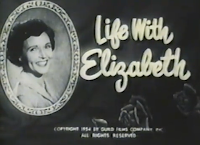Today would have been the 100th birthday of Betty White. She was not simply a beloved actress and comedian whose career spanned 80 years, but also a true television pioneer. It was in 1951 that she appeared in her first sitcom, Life with Elizabeth. She was not only the star of the show, but she was also one of its producers. This made Betty White one of the first women to ever produce a sitcom in American television. Life with Elizabeth would prove to be a groundbreaking show in other ways as well.
Life with Elizabeth centred on a married couple named Elizabeth (Betty White) and Alvin (Del Moore). Elizabeth was a mischievous sort and would often find herself in various misadventures. Usually after one of Elizabeth's various bits of mischief, announcer Jack Narz would ask her, "Elizabeth, aren't you ashamed?" Elizabeth would shake her head, before an impish grin would emerge on her face, showing that she was not ashamed at all. Each episode was divided into three plots, referred to as "incidents," of eight to ten minutes each.
Life with Elizabeth originated as a series of sketches on the talk and variety show Hollywood on Television that aired on KLAC in Los Angeles. The sketches featured Betty White as Elizabeth and her fellow host Al Jarvis as Alvin. Al Jarvis would leave Hollywood on Television in 1951 to be be replaced by Eddie Albert. Eddie Albert would leave after six months when he took another job. It was then in 1951 KLAC station manager Don Fedderson decided to spin-off the Elizabeth and Alvin sketches into their own show. Betty White, George Tibbles (who had been Betty's accompanist on Hollywood on Television), and Don Fedderson formed Bandy Productions to produce the new show.
Initially Life with Elizabeth aired live on KLAC on Saturday night at 8:30 PM Pacific. The show certainly attracted attention, with Betty White receiving the Emmy for Best Actress in 1951. Despite this, Life with Elizabeth was not picked up by any of the networks. While the networks did not pick up Life with Elizabeth, distribution and production company Guild Films approached Betty White, George Tibbles, and Don Fedderson about launching Life with Elizabeth into nationwide syndication. Ultimately, Bandy Productions and Guild Films entered into an agreement that would bring Life with Elizabeth to the entire United States.
While Life with Elizabeth aired live in front of a studio audience at KLAC, the syndicated version of Life with Elizabeth would be filmed with a single camera. These episodes would then be shown in front of an audience, whose reactions would then be recorded. In this way the episodes of Life with Elizabeth would feature the genuine laughter of an audience rather than a laugh track. Life with Elizabeth proved attractive to television stations, with 27 stations signing up to air the series.
Life with Elizabeth entered syndication in the fall of 1953. It ended its run in 1955 and after 65 episodes. While the show was still popular, Guild Films thought ending the show while it was still popular would help maximize profits for the existing episodes. The show would be rerun on local stations for years to come.
Although largely forgotten today, Life with Elizabeth was a pioneering sitcom. It certainly gave Betty White her first national exposure and thus launched her long career. As Betty White as also a co-producer on the show, with Life with Elizabeth she also became one of the first women in television to produce a show. Indeed, Betty had nearly total creative control over the show, something that was unusual in the early Fifties. Life with Elizabeth was also groundbreaking in breaking with the standard sitcom format, well-established on radio even before the first television sitcoms aired. Being divided into three "incidents" per show, it was a sharp contrast to such contemporary sitcoms as I Love Lucy and My Little Margie, which concentrated on one plot per episode.
Life with Elizabeth was also the first nationwide show produced by Don Fedderson, who would o onto a long career in television. He would also produce Betty White's next sitcom, Date with the Angels. He would go onto produce such shows as The Millionaire, My Three Sons, and Family Affair, .
Life with Elizabeth deserves to be better known than it is. It is a very funny show, demonstrating that Betty White had wit and comic timing from the very beginning. And it is every bit as much a pioneering sitcom as I Love Lucy is. Episodes of Life with Elizabeth are readily available on various streaming services as well as the Internet Archive. Anyone who loves Betty White, 1950s sitcoms, or classic television is encouraged to check it out.
Subscribe to:
Post Comments (Atom)



1 comment:
I watched Life with Elizabeth back when Hulu was free and had tons of old shows on it. My favorite segment is “Leaky Roof.” I also like the one where they are playing Monopoly. There was also a dollar bargain store near me that had it on dvd, along with Date with the Angels.
Post a Comment